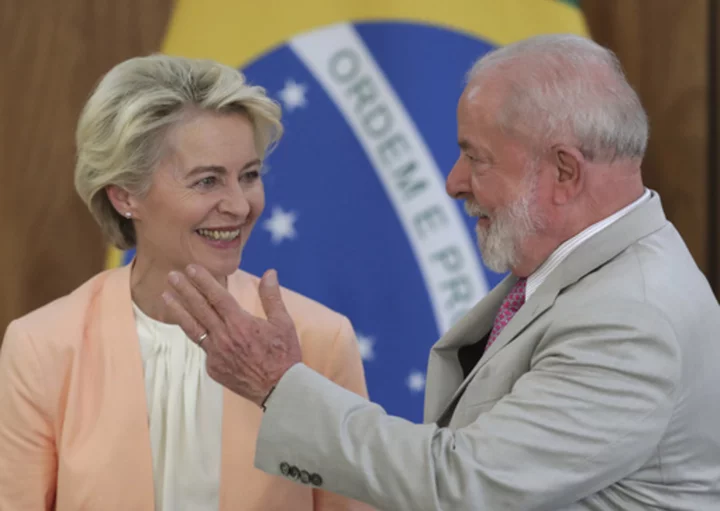BRASILIA, Brazil (AP) — European Comission President Ursula von der Leyen met with Brazilian President Luiz Inácio Lula da Silva on Monday in a bid to get a free trade deal moving again.
The 27-member EU completed negotiations in 2019 on a wide-ranging trade deal with Mercosur — comprised of Brazil, Argentina, Paraguay and Uruguay — but it has yet to be ratified by any of the individual countries.
Ratification stalled during the presidency of Lula’s predecessor, Jair Bolsonaro, due to the EU's concern over his environmental policies as well as a European desire to protect its local farmers from cheaper imports from Mercosur.
Proposed modifications of the original agreement have yet to get the process back on track.
In March, the EU sent a letter to Mercosur seeking to establish stricter environmental requirements for South American countries in order to persuade European nations to ratify the deal.
“We are very much looking forward to your answer, because it is our opening to listen to you, to listen where we have to improve,” von der Leyen said in prepared remarks after her meeting with Lula. “So that we can, indeed, by the end of the year, conclude the Mercosur agreement.”
But Brazil’s president openly expressed dismay with the proposal.
“The premise that needs to exist among strategic partners is of mutual trust and not distrust and sanctions,” he said.
The March letter doesn't explicitly mention sanctions, but rather proposes to make mandatory some of the environmental goals established by the Paris Agreement. Brazilian Foreign Minister Mauro Vieira has said that different interpretations of European law could mean failure to fulfill goals would result in sanctions.
The EU-Mercosur trade agreement is meant to link two markets with a total population of around 800 million people and accounting for about a fourth of the world’s gross domestic product.
It envisions leading to more than $100 billion in annual trade of goods and services by cutting customs duties and easing access for Mercosur agricultural exporters to the EU market and for European manufacturers to Mercosur countries.
Since Lula became president in January, members of his administration have raised questions about the agreement, said Lucas Leite, a professor of international relations at the Armando Alvares Penteado Foundation, a university in Sao Paulo. He said their concerns include whether Brazil's industrialized goods will be able to compete with European competitors and the possibility the nation could be negatively affected.
“The environmental standards are a challenge for the Brazilian government, which talks about the need to reindustrialize the country," Leite said. "This agreement would not be good for Brazil. We are only able to compete in the agricultural sector.”
Two officials within the foreign relations ministry told The Associated Press that many Brazilian diplomats are arguing that the EU's March proposal provides a good excuse to not ratify the agreement. The officials spoke on condition of anonymity because they were not authorized to speak publicly.
Amid the uncertainty over the deal, von der Leyen sought to show European solidarity with Brazil by announcing new spending programs.
She said the EU will invest 2 billion euros ($2.2 billion) for hydrogen production, a green energy project aimed at lessening dependence on fossil fuels. She said the EU also will provide 430 million euros to help fight deforestation and 20 million euros to the Amazon Fund to preserve the Amazon Forest.
“This is only the start,” von der Leyen said, adding that individual European nations and private donors are expected to complement the total. “Europe is back in Brazil, Europe is back in Latin America.”
Von der Leyen met with executives from Brazil’s industrial sector after her session with Lula.
Brasilia is the first stop on her Latin America tour. She will now travel to Argentina, Chile and Mexico, and meet with each nation's president. In July, EU members and the heads of state from the Community of Latin American and Carribean States are scheduled to hold a summit.
___
Associated Press writer Raf Casert in Brussels contributed to this report.

